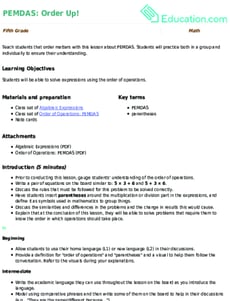5th Grade Exponents Lesson Plans
About 5th Grade Exponents Lesson Plans
On Education.com, fifth grade exponents lesson plans introduce young learners to understanding exponents as repeated multiplication, connecting to powers of 10, and exploring real-world applications. These lesson plans feature structured activities, guided exploration, and hands-on exercises that help students grasp the foundations of exponents. Materials include instructional guides, practice worksheets, and digital exercises that support classroom or at-home learning. This approach fosters an early understanding of exponents, preparing students for future math concepts.
The site provides a variety of resources like printable worksheets, interactive games, and structured practice exercises, all designed to make learning exponents engaging and accessible. These resources help students convert between exponential and expanded forms, evaluate exponential expressions, and relate exponents to real-life examples such as pH or Richter scales. Educators and parents can easily access ready-to-use materials that make reinforcing lesson objectives straightforward and effective.
Fifth grade exponents lesson plans support teacher instruction and parent-led practice by providing structured, standards-aligned materials. Students can build confidence in mastering exponents through fun, the focus on understanding and applying fundamental principles, such as repeated multiplication and pattern recognition, lays a strong student math foundation. With educational games, printable exercises, and visual models, these resources offer versatile ways for students to deepen their comprehension and develop reasoning skills.
The site provides a variety of resources like printable worksheets, interactive games, and structured practice exercises, all designed to make learning exponents engaging and accessible. These resources help students convert between exponential and expanded forms, evaluate exponential expressions, and relate exponents to real-life examples such as pH or Richter scales. Educators and parents can easily access ready-to-use materials that make reinforcing lesson objectives straightforward and effective.
Fifth grade exponents lesson plans support teacher instruction and parent-led practice by providing structured, standards-aligned materials. Students can build confidence in mastering exponents through fun, the focus on understanding and applying fundamental principles, such as repeated multiplication and pattern recognition, lays a strong student math foundation. With educational games, printable exercises, and visual models, these resources offer versatile ways for students to deepen their comprehension and develop reasoning skills.















